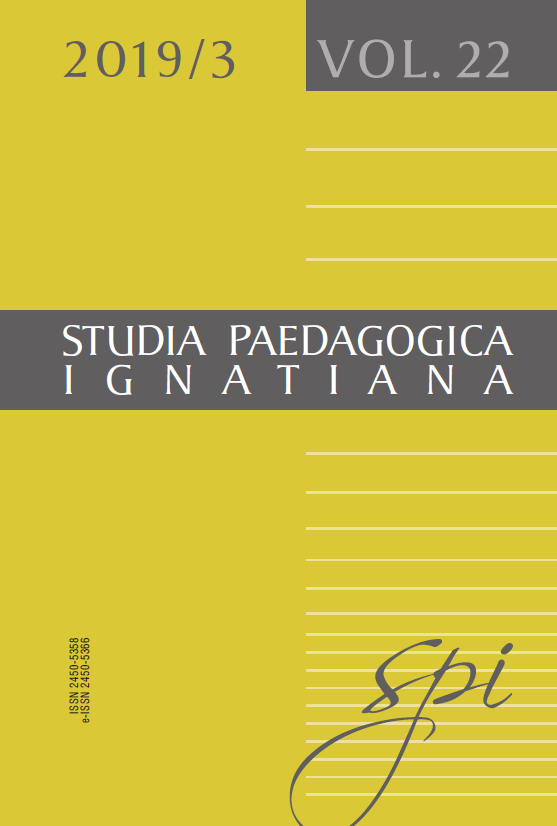Supporting the Development of the Executive Functions of Pre-school Children as an Early Preventive Action
DOI:
https://doi.org/10.12775/SPI.2019.3.005Keywords
executive function of children, early preventive action, pre-school children, executive function as a protective factorAbstract
The intensive physical, socio-emotional, cognitive and moral development of children at pre-school age means that preventive intervention introduced at such an early age can bring benefits and lead to significant changes in the child’s present and future functioning. When supported as a part of preventive activities, the dynamic development of executive functions which falls around the age of 4–5 in a child’s life can contribute to the strengthening of school readiness, and higher results in the following areas: language skills, mathematics and social competences. In the article, the author has presented the concept of executive functions and their types. Also taken into account are arguments for creating conditions for children to develop executive functions as a factor protecting their educational development against future anti-social behavior, behavioral addictions and psychoactive substances. In the last part, the author presents examples of early prevention measures that can be included in the education of a pre-school child.
References
Bańko A. (2002). Społeczna psychologia środowiskowa, Warszawa: Wydawnictwo Naukowe Scholar.
Blair C., Zelazo P.D., Greenberg M.T. (2005). The Measurement of Executive Function in Early Childhood, „Developmental Neuropsychology”, t. 28, nr 2, s. 561–571. DOI: 10.1207/s15326942dn2802_1.
Bull R., Espy K.A., Wiebe S.A. (2008). Short-Term Memory, Working Memory, and Executive Functioning in Preschoolers: Longitudinal Predictors of Mathematical Achievement at Age 7 Years, „Journal Developmental Neuropsychology”, t. 33, nr 3, s. 205–228. DOI: 10.1080/87565640801982312.
Brzezińska A.I., Nowotnik A. (2012). Funkcje wykonawcze a funkcjonowanie dziecka w środowisku przedszkolnym i szkolnym, „Edukacja. Studia, Badania, Innowacje”, nr 1(117), s. 61–74.
Brzezińska A.I., Appelt K., Ziółkowska B. (2016). Psychologia rozwoju człowieka, Sopot: Gdańskie Wydawnictwo Psychologiczne.
Cierpiałowska L., Ziarko M. (2010). Psychologia uzależnień – Alkoholizm, Warszawa: Wydawnictwa Akademickie i Profesjonalne.
Dawson P., Guare R. (2012). Zdolne, ale rozkojarzone. Wspieranie rozwoju dziecka za pomocą umiejętności wykonawczych, przeł. W. Turopolski, Kraków: Wydawnictwo UJ.
Deptuła M. (2005). Indywidualne ścieżki ryzyka i związana z nimi interwencja profilaktyczna, [w:] M. Deptuła (red.), Diagnostyka, profilaktyka, socjoterapia w teorii i praktyce pedagogicznej, Bydgoszcz: Wydawnictwo UKW, s. 158–184.
Deptuła M., Potorska A., Borsich S. (2018). Wczesna profilaktyka problemów w rozwoju psychospołecznym i ryzykownych zachowań dzieci i młodzieży, Warszawa: Wydawnictwo Naukowe PWN.
Erikson E.H. (1997). Dzieciństwo i społeczeństwo, przeł. P. Hejmej, Poznań: Dom Wydawniczy Rebis.
Hammond S.I., Müller U., Carpendale J.I.M., Bibok M.B., Liebermann-Finestone D.P. (2012). The Effects of Parental Scaffolding on Preschoolers’ Executive Function, „Developmental Psychology”, t. 48, nr 1, s. 271–281, http://dx.doi.org/10.1037/a0025519.
Holmes Ch.J., Kim-Spoon J., Deater-Deckard K., Tech V. (2016). Linking Executive Function and Peer Problems from Early Childhood through Middle Adolescence, „Journal of Abnormal Child Psychology”, t. 44, nr 1, s. 33–42. DOI: 10.1007/s10802-015-0044-5.
Kielar-Turska M., Białecka-Pikul M., Skórska A. (2006). Rozwój zdolności mentalizacji. Z badań nad związkiem teorii umysłu, sprawności językowych i funkcji zarządzających, „Psychologia Rozwojowa” t. 11, nr 2, s. 35–47, <http://cejsh.icm.edu.pl/cejsh/element/bwmeta1.element.ojs-issn-2084-3879-year-2006-volume-11-issue-2-article-3033> [dostęp: 20.07.2019].
Myiake A., Friednam N.P. (2000). The Nature and Organization of Individual Differences in Executive Functions: Forum General Conclusions, „Current Directions in Psychological Science”, t. 21, nr 1, s. 8–14. DOI: 10.1177/0963721411429458.
Nęcka E., Orzechowski J., Szymura B. (2013). Psychologia poznawcza, Warszawa: Wydawnictwo Naukowe PWN.
Packwood S., Hodgetts H.M., Tremblay S. (2011). A Multiperspective Approach to the Conceptualization of Executive Functions, „Journal of Clinical and Experimental Neuropsychology”, t. 33, nr 4, s. 456–470. DOI: 10.1080/13803395.2010.533157.
Putko A. (2008). Dziecięca „teoria umysłu” w fazie jawnej i utajonej a funkcje wykonawcze, Poznań: Wydawnictwo Naukowe UAM.
Sikorska I. (2016). Odporność psychiczna w okresie dzieciństwa, Kraków: Wydawnictwo Uniwersytetu Jagiellońskiego.
Smykowski B. (2005). Wiek przedszkolny. Jak rozpoznać potencjał dziecka?, [w:] A.I. Brzezińska (red.), Portrety psychologiczne człowieka, Sopot: Gdańskie Wydawnictwo Psychologiczne, s. 165–205.
Valcan D.S., Davis H., Pino-Psternak D. (2018). Parental Behaviours Predicting Early Childhood Executive Functions: A Meta-Analysis, „Education Psychology Review”, t. 30, nr 4, s. 607–649. DOI: 10.1007/s10648-017-9411-9.
Whitebread D. (2018). Quality in Early Childhood Education: The Contribution of Developmental Psychology, [w:] M. Fleer, B. van Oers (red.), International Handbook of Early Childhood Education, t. 1, Dordrecht: Springer, s. 319–334. DOI: 10.1007/978-94-024-0927-7_14.
Wygotski L.S. (1971). Wybrane prace psychologiczne, przeł. E. Flesznerowa, J. Fleszner, Warszawa: Państwowe Wydawnictwo Naukowe.
Downloads
Published
How to Cite
Issue
Section
License
By submitting an article, the author declares that:
they are the author of the article (hereinafter referred to as the Work) and:
- is entitled to exclusive and unlimited copyright to the Work,
- is entitled to dispose of the copyrights to the Work.
The Author grants the Jesuit University Ignatianum in Cracow a free, non-exclusive, territorially unlimited license to use the Work in the following fields of exploitation:
- publishing the Work in paper, digital or magnetic form;
- multiplying the work by any method, without limiting the number of editions or copies;
- distribution of the work and its copies in any form, including marketing, sales, lending, and lease;
- placing the work in a computer memory;
- distribution of the work in information networks, including the Internet;
- public performance, exhibition, display, reproduction, broadcasting and re-broadcasting, as well as making the Work available to the public in such a manner that everyone could have access to it at a time and place chosen by themselves;
- within the scope of dependent rights to the Work, covering, in particular, the right to make necessary changes to the Work, resulting from editorial and methodical preparation, as well as to make translations of the Work into other languages.
The license right shall be transferred the moment of transfer of the Work to the Jesuit University Ignatianum in Cracow. The Jesuit University Ignatianum in Cracow is entitled to grant sub-licenses to the Work in terms of the right granted. The license shall be limited in time for a period of 15 years from the date it is granted.
Stats
Number of views and downloads: 5356
Number of citations: 0



